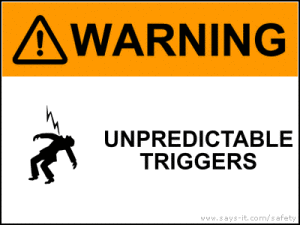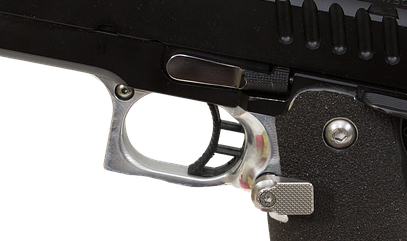Get Rid of Your Triggers, Part 1

Emotional triggers are funny things.
A trigger is a visceral reaction to something--it could be a scene in a movie, a subject of conversation, a particular object, a memory, a person's words or tone of voice--pretty much anything that brings up an irrational and seemingly uncontrollable response in a person by reminding them of an old emotional hurt.
Triggers form in response to trauma, and their purpose is to protect you from physical, mental, or emotional harm. But often, when we outlive the situation that caused the trigger to form, the trigger stops protecting us and becomes a hindrance in our everyday lives, sometimes harming us in ways we are oblivious to.
The subject of emotional triggers and how they should be dealt with has become a hot topic in recent years. Everyone from psychologists to Twitter experts to clickbait authors are encouraging us to learn about our triggers so that we can avoid them, and to learn the triggers of those we care about in order to prevent them from feeling negative emotions. The "trigger warning" has become a holy rite for pop culture. But is avoidance really the best strategy for dealing with triggers? I don't think it is.

In my opinion (arrived at through years of painful but necessary experience), the best thing to do with triggers is to excise them from your emotions and your life.
This is not an easy proposition. It can take work. Years of it, maybe, depending on how traumatic the source of the trigger is and how attached you are to it. But excising triggers is well worth the trouble if you want to improve your relationships with yourself and others, reduce stress, and increase your overall happiness.
I'll go over ways to get rid of your triggers in Part 2 of this series. First, there are a few things you should know about what a trigger is, and isn't.

Triggers are irrational.
Because they are rooted in traumatic emotional experiences, triggers block you from thinking or behaving rationally in certain situations. In most situations, it is preferable to respond rationally to stimuli. There are a few types of situations where it is necessary (and unavoidable) that instinct takes over, but for the most part, the more we are able to think through a situation and offer a measured, logical response, the better our outcomes will be.
Triggers do not protect you.
It's important to make the distinction between an emotional trigger and a primal, fight-or-flight instinct. The primal instinct tells us to run when the house is engulfed in flames, or to get ready to fight off an intruder in our house. But when you are triggered, your fight or flight response is being activated in a situation where no fight or flight is required. It's not primal instinct that you are feeling; it's a pattern that has been programmed into your subconscious (likely when you were very young) that tells you x is dangerous, even if it's not.
Let's say that Lucy grew up with an abusive mother who took sadistic pleasure in beating Lucy with her wooden cutting board. Now that Lucy is grown up, whenever she sees a wooden cutting board she freezes in fear. Her heart pounds in her throat; she breaks into a cold sweat; and tears rise as her mind relives the many torture sessions she endured at the hands of her mother and the cutting board. Clearly, this trigger formed in response to a very real danger. When Lucy was young, if she saw her mother grab the wooden cutting board, her instincts kicked in to help her flee and hide from her mother. But now that she is an adult and no longer subject to her mother's violent rages, cutting boards pose no danger to her. Rather than avoiding cutting boards, it would be better for Lucy to work on eliminating this trigger so that she does not have to relive her childhood trauma every time she sees an innocent cutting board.
Triggers are not part of your identity.
Your memories and experiences will always be a part of you. If some of them have resulted in the formation of an emotional trigger that is no longer serving you, doing the work to remove that trigger will not make your memories or experiences go away. It will not change the components of your past that have made you who you are today. Doing this work will only change how you experience life now and in the future. It will make interpersonal communication easier and less confusing. It will lower your stress levels and anxiety. It will make it easier to connect with others in a positive way. It will increase your confidence and self-love.

Triggers are made to be pulled.
Think about it. It's in the name. Just like a trigger on a firearm, these emotional phenomena are pressure sensitive for a reason, and when they are squeezed, an explosion occurs. But unlike a trigger on a gun, emotional triggers are "squeezed" or go off in response to non-threatening stimuli, and are generally not under the control of the operator (you). Don't spend your life shooting at shadows, or shooting yourself in the foot. Save your emotional ammunition for when it's actually called for, and remain in control of your responses as much as possible.
Check back tomorrow for Part 2 of this series, with some techniques for actually excising those triggers!

Hi, I'm Starr!
I believe all human interactions should be consensual

Thanks for the contribution. Steem is now the most used blockchain!
To listen to the audio version of this article click on the play image.

Brought to you by @tts. If you find it useful please consider upvote this reply.
This is an important message - especially now that college students are demanding teachers avoid subjects that might "pull their triggers."
I'd last about 4 hours as a college professor. I'd probably tell the kids, "Great. I'm gonna keep pulling your trigger until you run out of ammo."